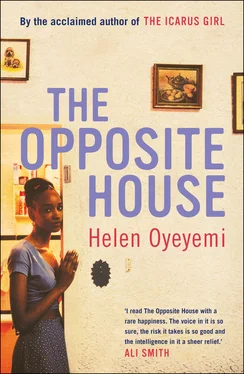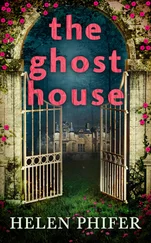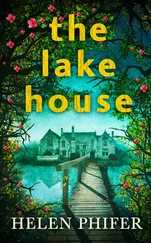Helen Oyeyemi - The Opposite House
Здесь есть возможность читать онлайн «Helen Oyeyemi - The Opposite House» весь текст электронной книги совершенно бесплатно (целиком полную версию без сокращений). В некоторых случаях можно слушать аудио, скачать через торрент в формате fb2 и присутствует краткое содержание. Год выпуска: 2008, Издательство: Bloomsbury UK, Жанр: Современная проза, на английском языке. Описание произведения, (предисловие) а так же отзывы посетителей доступны на портале библиотеки ЛибКат.
- Название:The Opposite House
- Автор:
- Издательство:Bloomsbury UK
- Жанр:
- Год:2008
- ISBN:нет данных
- Рейтинг книги:4 / 5. Голосов: 1
-
Избранное:Добавить в избранное
- Отзывы:
-
Ваша оценка:
- 80
- 1
- 2
- 3
- 4
- 5
The Opposite House: краткое содержание, описание и аннотация
Предлагаем к чтению аннотацию, описание, краткое содержание или предисловие (зависит от того, что написал сам автор книги «The Opposite House»). Если вы не нашли необходимую информацию о книге — напишите в комментариях, мы постараемся отыскать её.
The Opposite House — читать онлайн бесплатно полную книгу (весь текст) целиком
Ниже представлен текст книги, разбитый по страницам. Система сохранения места последней прочитанной страницы, позволяет с удобством читать онлайн бесплатно книгу «The Opposite House», без необходимости каждый раз заново искать на чём Вы остановились. Поставьте закладку, и сможете в любой момент перейти на страницу, на которой закончили чтение.
Интервал:
Закладка:
She had a small plate in front of her that stayed completely clean throughout dinner, though she watched Amy Eleni’s plate and thoughtfully sipped at water.
Pudding was caramelised pears; golden, sticky, sweet agony to smell, greater agony to discard after a couple of nervous pokings with our spoons. Amy Eleni and I didn’t look at each other. In some of Chabella’s apataki , the Orishas intervene to stop a mother from ‘eating her child in spirit’. I wanted an Orisha to come and smite Despina so that I could get on with my caramelised pears.
After dinner, as soon as was decent, Amy Eleni and I went down to Whitechapel and got chocolate rugelaches at Rinkoffs. We sat on railings and stuffed doughy biscuit and chocolate, talking and spraying each other with food, seeing who could be the most disgusting.
I asked her if dinner was always like that, or whether it
was just because I was there. Amy Eleni clutched her hair and pulled at it. ‘Oh, truly. I’m not mad! I’m not mad! I don’t want to die!’
‘There’s someone inside of me, and she says I must die! Jesus!’ I said.
‘Christmas dinner is always particularly jolly at the Lang household,’ she said, and laughed so hard that she accidentally pushed rugelach out of her nostrils.
Once my sets are over, Chabella, Amy Eleni and I stay at the café, relocating to the furthest circle from the stage. In the shade Amy Eleni and I snigger at the newest style of bad recital. A lot of the poems are about willow trees. A couple of the poems Amy Eleni and I debate back and forth over; they are so overwrought that they have to be po-faced comedy. Unexpectedly, Chabella likes one of them, says that that particular poet’s representation of the tree manages to both promise and conceal dark things. She compares the structure to a highly condensed version of the first simple but strong poem she ever learnt in German, Goethe’s ‘The Erl King’, a poem that neither Amy Eleni nor I can remember. We shut up and drink our Cuba Libres. Someone rests a hand on my shoulder; I turn and a sweet-faced, curly-haired girl — maybe a Hispanic Cuban, maybe a girl that I should know — leans across the table to kiss Chabella, nods apologetically at Amy Eleni and crouches down beside my chair to talk to me.
‘I loved your singing,’ she says. Before I can thank her she continues, ‘And I saw your Mami, and your name on the programme. And I remembered you.’
She smiles at me, shushes Mami, daring me to guess who she is. Her accent is strong, so she is recent, and I want to help her out; I try not to sound too English when I reply, but I can’t help it — she isn’t family.
‘I remember your face, I think,’ I say, hesitantly.
‘I know yours,’ she says. ‘We used to play together before you left Habana. Then when you left, our mothers kept swapping photos of us. In your photos you were always in jeans. We sent you a photo of me on my quinceanera , but I remember we didn’t get one back from you because you said you didn’t want a quinceanera; you insisted that turning fifteen was no big deal, that you didn’t ask to be born. That made me laugh a lot.’
I keep looking at the girl, but I still have no idea who she is; Chabella has flashed me so many photos of Cuban girls that I doubt I could even individually identify my cousins by name. I smile to buy time, but she throws her hands up and tells me that my time is up.
‘It’s Magalys Pereira-Velázquez,’ she says, and I smile open-mouthed to show that I am glad and to hide that I still don’t have a memory to put her face and her name together with. ‘The last time we saw each other, your parents were having a leaving party,’ Magalys says, and then I do remember; I remember that she was the girl from Vedado. Magalys is the girl who was under the table with me when the woman came and sang to us. Suddenly I am frightened that she will somehow remember that I didn’t help her. I hold my arms around myself to hold Magalys away.
Chabella is fretting to call Tomás and make sure that he’s safe and snug and asleep. I point out that if he is asleep she’ll wake him, but she holds out her hand for my phone. Her lip quivers and I lose my nerve. Seconds later she is cooing down the line at Tomás. The only people still sprinkled around the café tables are couples or prospective couples with their voices set to murmuring and their faces close together.
Amy Eleni has to teach tomorrow, but, late as it is, she stays and smokes and is unusually low on comments, and I know then that her break-up has been hard on her. I can’t stop glancing at the phone number that Magalys soft-pencilled onto a napkin before she left, but I don’t want to talk to her because the memory of the leaving party is mine and she doesn’t belong in it. Magalys has so much more of Cuba than I do; she proves it by walking up with her easy smile and strong accent.
The murmur around us peaks and dips, and I look up to see an old black man, grey haired with a long face sectioned up by an anxious smile, arms bearing a blizzard of white roses. He is inching up to us, and he is Papi, and his eyes are on Chabella.
‘OK, good night London baby, my little dwarf. Sleep well,’ Chabella tells Tomás weakly, and pushes a number of wrong buttons before ending the call, smiling at Papi, drawing him on.
I look around at everyone else, and everyone is looking at us. I am happy and embarrassed and stressed and I want to get up and help Papi, take his arm, but I know that he would hate that. So I wait in agony until he is directly before Mami and bends to kiss her cheek and say he’s sorry, and then Amy Eleni stomps the ground and whoops and starts the clapping. Out of the corner of her mouth, she says to me, ‘What’s going on?’
I tell her it’s an anniversary, or a long story — I tell her that she should take her pick.
* * *
When we leave the café, Amy Eleni comes to wait for my bus with me. She looks at me for a long time, her eyes a deep green, dryadic despite the cold.
‘I’m not mad, I’m not mad,’ she tries, a smile touching her lips. ‘I don’t want to die.’
I should do what? I should smile, or I should respond.
There’s someone inside of me, and she says I must die .
But something is happening here, something that doesn’t fall into good, OK, or bad. The hysteric isn’t appealing to me; there is no need to beat her. I keep thinking, maybe if I could just know what my son looks like, who my son is, then I will be all right. I have strangeness in my family, a woman who was a priest when she wasn’t supposed to be. I have delicacy in my family. I think. I don’t know, am I delicate? I know by now that I am not going to be one of those pregnant women who touches her stomach in public; even when I am heavily pregnant I will keep my hands by my sides and keep a circumspect eye on the situation.
I tell Amy Eleni I am pregnant. I just say it. She winces, and I need to know why she did that, but immediately afterwards she says, ‘Maja, that’s wonderful. Aaron must be. . Maja, that’s. .’
We hug; her hands dig into my shoulder blades as our heads bump. ‘He doesn’t know,’ I say into her ear.
Amy Eleni’s frown is full of needles; to donate eggs you are screened for
HIV
cystic fibrosis
hepatitis B
hepatitis C
cytomegalovirus
and they do a chromosomal analysis too.
All this I saw underlined in her leaflets; Dr Maxwell screened me for them when I saw her. Amy Eleni’s frown is full of test results printed on thin crackly paper with hole-punched edges. It’s bloated with daily hormone injections, her frown. It goes on forever.
‘What, is it not his kid or something?’
Читать дальшеИнтервал:
Закладка:
Похожие книги на «The Opposite House»
Представляем Вашему вниманию похожие книги на «The Opposite House» списком для выбора. Мы отобрали схожую по названию и смыслу литературу в надежде предоставить читателям больше вариантов отыскать новые, интересные, ещё непрочитанные произведения.
Обсуждение, отзывы о книге «The Opposite House» и просто собственные мнения читателей. Оставьте ваши комментарии, напишите, что Вы думаете о произведении, его смысле или главных героях. Укажите что конкретно понравилось, а что нет, и почему Вы так считаете.












